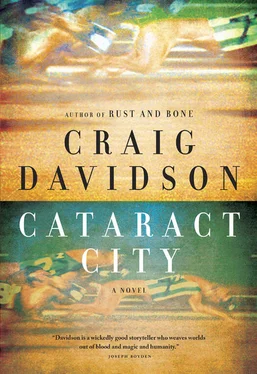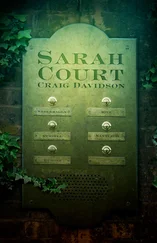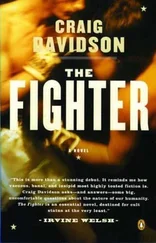“Anyway, it’s not your fault,” Dunk told her.
Dade Rathburn looked weird in his coffin. A deflated pool toy packed up for winter storage. His dentures were snug, at least, and his eyes were closed. Bovine said his dad had to cut the muscles under his eyelids so they’d roll down, then crazy-glue them shut.
I remember everyone watching us. I had no urge to spit on Rathburn. Whatever I felt was far too complicated to ever express.
After the funeral my father told me he’d prefer it if I didn’t hang out with Dunk anymore. Dunk’s dad was of the same mind. It seemed unfair, as if we were the victims of our fathers’ guilty consciences. Had I been seventeen I would have told Dad to suck an egg. But I was twelve, and soon enough Dunk and I just drifted apart. I couldn’t say how it happened. That strong childhood magnetism that draws one boy to another — sometimes that magnetism abruptly switches polarities, flinging those same boys away from each other, setting them on new trajectories.
My family moved to Cardinal Gardens, a suburb in the city north. Our new house had an in-ground pool and a two-car garage. The day the moving truck came, Dunk stood on the sidewalk dribbling a balding basketball.
“So you’re moving, huh?”
“Is it that obvious?”
I’d meant it as a joke. He blew the hair out of his eyes — it was even longer than when I’d met him, the ends almost touching his nose — and smiled into the sunlight.
“You can always come visit,” I said.
“And you can always visit back here.”
That was the last I saw of Duncan Diggs for many years.
The next week I was in our new home flicking through TV channels and came upon an episode of Superstars of Wrestling . It shocked me how fake it looked. Punches and kicks missing by a mile. I watched a few minutes, then flipped to another channel.

DAWN EASED OVER THE ESCARPMENT, sunlight glimmering like a sine wave across the curve of the earth. I stretched my legs inside the car, wincing as the familiar pain cupped my kneecap. Fogerty’s “Who’ll Stop the Rain” had segued into Henley’s “Boys of Summer,” which had segued into a late-night call-in show about paranormal phenomena.
I had zoned out, lost myself down the memory hole, and now the dashboard clock was reading 5:26 and the gas tank was near empty. I stepped out of the car and began to walk.
The cut-off was fringed by long grass bent by a forceful night wind. Sun lightened the eastern fields. The world was cool, wind bearing the smell of burning grapevines. I had nothing on but a thin jacket, yet I didn’t feel cold. Sunlight sparkled the tips of pine trees struggling through soil determined to spit them out.
I walked until the path began to collapse at its edges. It dipped and I followed … until at last a million tiny cogs seized in every part of my body and I stopped. The woods were closing in on me. Still, I didn’t feel terrorized like I had as a boy. I took in the silky rustle of leaves, that cut-potato smell of the soil. Felt an odd jangle in my nerve endings. I couldn’t quite leave behind the sight of a thin curvature of sunlight on the Lincoln’s hood, so metallic and man-made and human . Couldn’t abandon myself entirely to those woods.
Maybe if Dunk were here … or maybe there are some paths you can never go down again. I headed back to the car, laughing at my cowardice.
I dropped the Lincoln into gear and reversed down the cut-off. Back to the world as it existed. But it was good to remember that, long ago, it had been just Dunk and me, the two of us. Two boys in the woods. How far had we fallen from that?
I drove to the nearest gas station, filled the tank and paid the sleepy-eyed attendant slumped inside his bulletproof Lexan cube. It was rare for me to be up so early — under normal circumstances I’d be inert while my liver filtered whatever I’d drunk the night before — but I relished it. Soon enough the sun would climb to its familiar position, illuminating the sadly familiar sights of the city and ruining the sense of possibility. But until then, there was the lovely silence, the fresh, indescribable smell of a new day — if pure possibility had a smell, this was it — fledgling sunlight washing the grape fields and the rippling surface of the river.
Staring at that swift, dark-running water, a fresh memory hit me with the force of a ballpeen hammer.
I must have been seven years old — or eight? Anyway, I was in that human-wallpaper stage of my existence. My father had taken me to the river. We’d go every so often to skip rocks and hunt for crayfish. One afternoon while Dad was taking a whiz I’d spotted a Hefty trash sack bobbing at the river’s edge. It had been sucked into a pool where the current swirled endlessly between the rocks; the pool was edged with the froth that built up at certain spots, crusty and opaque like the scum atop a pot of boiled pork.
The bag was of the heavy-gauge plastic you’d find wrapping scrap lumber in construction-site Dumpsters; the top was crudely knotted. I remember wondering what was inside, and tearing it open, driven by sudden wild curiosity — there was something about the placement of the bag, I guess; the sullenness of it bobbing in the shallows. At first I’d just stared, head cocked, profoundly puzzled. The contents looked like soggy balls of yarn, the kind Mom used to make macramé potholders and tiered flower holders. Except there was nothing vibrant about the colours: mixed muddy browns and washed-out whites. Then I caught a glimpse of a little arrow shape tufting from one of those balls and it was like when you stare at one of those 3D portraits just right — your eyes adjust and you see the sailboat or the train or whatever. When I saw the whole picture I reared back, horrified at a bone-deep, subcellular level.
Kittens. I could tell by that one tiny ear. How many? Four, five. I didn’t look long enough to know. Kittens stuffed in a trash sack and hurled in the river. Even at that age, it struck me that they almost certainly hadn’t drowned: the sack was so thick and the kittens almost weightless, so it’d probably just bobbed on the surface, too light to sink; perhaps the person who’d done it had watched the sack drift down the Niagara and said, “Huh.” With awful clarity I imagined the kittens tearing at the sack with their little claws. But the plastic was too durable. They would have suffocated.
I stepped away, the horror so thick in my gorge that I thought I’d throw up. The bag shifted and I saw something else: the greenish plastic head of a glow-in-the-dark Jesus. A snatch of song came to me: Well, I don’t care if it rains or freezes / Long as I have my plastic Jesus / Riding on the dashboard of my car . Whoever had done this must’ve been queerly religious, or else had a warped sense of humour. Jesus’s head was shattered at the top, just above his crown of thorns. One of the kittens must’ve bitten it off.
I slumped back in the car seat, assaulted by the memory. But that’s my city in a nutshell — or a trash sack. People around here think if they stuff their problems in a bag, huck it in the water, well, end of problem. And that theory has borne out, for the most part. In my line of work I see proof, over and over.
I drove home in the warm light, my mood curdling further when three police cruisers shrieked past in the opposite lane. I unlocked my apartment, stared for a moment at the empty dog bed in the kitchen, un-holstered my pistol and popped two pills to quiet the pain singing in my kneecap. I fell into a troubled, profoundly exhausted sleep.
PART TWO. DOLLY EXPRESS: DUNCAN DIGGS
Читать дальше













